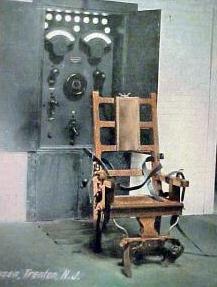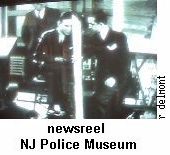

![]() Listen
to Richard
Hauptmann's Statement of Innocence
Listen
to Richard
Hauptmann's Statement of Innocence
![]() Why
Did You Kill Me? by Richard
Hauptmann
Why
Did You Kill Me? by Richard
Hauptmann
![]() Death
In Texas by Sister Helen Prejean
- NY Review of Books
Death
In Texas by Sister Helen Prejean
- NY Review of Books
![]() The
Death of Innocents: An Eyewitness Account of Wrongful Executions
The
Death of Innocents: An Eyewitness Account of Wrongful Executions
![]() Freedom of Information Act - 1368 pages of Lindbergh Files
Online
Freedom of Information Act - 1368 pages of Lindbergh Files
Online
The bell tolled as it always had in the Flemington, NJ courthouse when the jury made its decision. There were no witnesses to the disappearance or death of the Lindbergh baby but the jury found Hauptmann guilty of murder in the first degree on February 13, 1935.
Hauptmann was sentenced to death in the electric chair.
Many Americans wanted to see Hauptmann (the "Nazi," the alien, the foreigner) punished severely for such a heinous "crime." David Wilentz took advantage of xenophobic feelings at the time by tell the jurors, in his closing arguments, that "no American could have killed that child."

But Richard Hauptmann warned everyone before his death "You think this is like a book you can close. This will never close." And - he was right. Here we are - 70 years later, wondering how this "kidnapping" could have happened.
The first jury ballot consisted of five for life imprisonment. The five voters were Pill, Snyder, Smith, Cravatt, and Hockenbury. They voted again. This time, Snyder and Pill voted for death. The next time, Hockenbury changed his vote to death. A fourth vote, and Smith agreed on the death sentence.
Finally, after five votes and many hours of arguing, Cravatt voted for death. He said he was unsure about the death penalty because Hauptmann's life could not be returned if new evidence proved him not to be the killer years later. The jury spent eleven hours and fourteen minutes in deliberation.
Hauptmann was taken to his cell. Once he was released from the handcuffs, he fell. His face made contact with the floor. He was lifted to his little cot, where he began to cry.
The defense appealed the verdict, but the Supreme Court of New Jersey upheld the verdict on October 9, 1935. Hauptmann's lawyers appealed to the United States Supreme Court, but it was denied.
He was to be electrocuted on January 17, 1936 but Gov Harold G Hoffman did not believe the defendant had received a fair trial and wanted to delay the execution. The Governor's announcement, on December 5, 1935, appeared in the newspapers and the very next day, Charles Lindbergh gave his wife orders to be ready to move to Europe on 24-hour notice. Anne reveals this in her diary of Dec.6, 1935.
So, what was Lindbergh really running away from?
If the Governor was planning to reopen the investigation, as stated in the newspaper on Dec 5, what exactly caused Lindbergh's sudden take-off? Were the questions of a skeptical governor a threat to Charles Lindbergh?
He claimed it was new death threats to his second son, Jon, but that makes no sense since Lindbergh had already shown no interest in protecting the second child when he took his wife on a 6 month trip right after she gave birth to him. It was only a few months after the first child's body was discovered and the Lindberghs left their newborn with a maid - and the supposed death threats.
The Lindbergh Kidnapping Hoax Forum Debates
Michael Donner
Hauptmann's guilt
Fri Feb 22 2002
I think Hauptmann was guilty of extortion. The evidence proves to me beyond a
reasonable doubt the he was guilty of that.
The problem I have with this case is that Hauptmann was executed, and I firmly
believe that the prosecution's evidence, for the reasons I have discussed at
length, was wholly insufficient to support the felony murder charge. Second
degree murder was a stretch, but, I believe, supported by the evidence (some of
you dispute that that evidence was sufficient, and I tend to agree with your
arguments that that evidence was, to put it mildly, tainted); but capital
murder? I come back to the prosecution's lack of temporal evidence; that is,
where is the evidence that the child was killed sufficiently proximate in time
to the breaking/entering for the jury to find beyond a reasonable doubt that he
killed the child IN THE COMMISSION OF the burglary? The prosecution was required
to prove that, and, in my opinion, they failed. The jury's conclusion was based
on speculation, and, by definition, speculation is less certain than beyond a
reasonable doubt.
So, I'm not saying that Hauptmann was an innocent dupe. What I am saying is that
he was entitled to due process of law. That he was entitled to require the
prosecution to prove EVERY element of their case beyond a reasonable doubt,
regardless of the nature of his crime. I don't think he received that here, for
the reasons I have already discussed
Sam
Bornstein
For Verdict Defenders like me
Sun Sep 22 2002
Richard A. Knight, Lawyer (graduate of the University of Texas and Harvard
Law School), writing in the Forum and Century, January, 1936:
“Last Spring, in the midst of a mob of peanut eaters in an atmosphere
suggestive of a cockfight rather than of a court, Hauptmann was tried and found
guilty, allegedly on circumstantial evidence, not of kidnaping nor of extortion
but of murder. Now kidnaping is one thing, and extortion is another, and murder,
quite distinctly, is yet a third. And in the record compiled at that trial there
is no more evidence that the man is guilty of murder than there is that you or I
am.
The fundamental requirement for the sufficiency of circumstantial evidence to
sustain a conviction for murder or indeed any other crime is that it must be so
strong as to exclude all other hypotheses than that of the accused’s guilt of
the crime as charged. Any lawyer will confirm to you that in the whole of
the criminal law there is no more elementary or perfectly settled rule than
this. And there is nothing esoteric, nothing complicated about it; it is
precisely as simple as it sounds. With it clearly in our minds, each of us at
once becomes as well qualified to pass upon the propriety of the affirmance of
the conviction by the Appellate Court as the Supreme Court of the United States
is.
Now, specifically Hauptmann was charged with murder by virtue of having, while
perpetrating a burglary, accidentally killed the baby on the Lindbergh
premises – a technical kind of murder, obviously, since no murderous
intent is required by it to be established. In accordance, then, with the rule I
have just recited, for his conviction to have been properly sustained,
circumstantial evidence not merely of the child’s death but of its accidental
death on the premises must not only have been introduced into the record
but must have been so strong as to exclude the possibility of any other
hypothesis. This is the exact and inarguable essence of the whole case.
Unless in that gross ton of evidence which was sent up from the trial court
these two facts were overwhelmingly established, not a pound of it could
properly avail to sustain the conviction, and all the ingenious deductions from
the wood of the ladder and from the handwriting of the ransom notes and all the
testimony respecting the passage of the ransom money and all the admissions
wrung from Hauptmann himself respecting the viciousness of his own past and
indeed anything and everything else in the whole record was and is wholly
immaterial. All those things may conclusively prove the crime of kidnapping
or that of extortion. But it is with the crime of murder and murder only
that the Appellate Court was concerned – that accidental killing in the course
of the commission of that burglary on those premises – it had to find
overwhelming evidence of that.
Well, every gum chewer in the subway knows that there is no such evidence in the
record.”
![]() New!
since April 2020 - YOU TUBE LKH Channel
New!
since April 2020 - YOU TUBE LKH Channel
![]() Ronelle
Delmont's Lindbergh
Kidnapping Hoax Forum
Ronelle
Delmont's Lindbergh
Kidnapping Hoax Forum
Ronelle@LindberghKidnappingHoax.com
![]() Michael
Melsky's
Lindbergh Kidnapping Discussion Board
Michael
Melsky's
Lindbergh Kidnapping Discussion Board
Directory Books Search Forum Home Transcript Sources
© Copyright Lindbergh Kidnapping Hoax 1998 - 2020